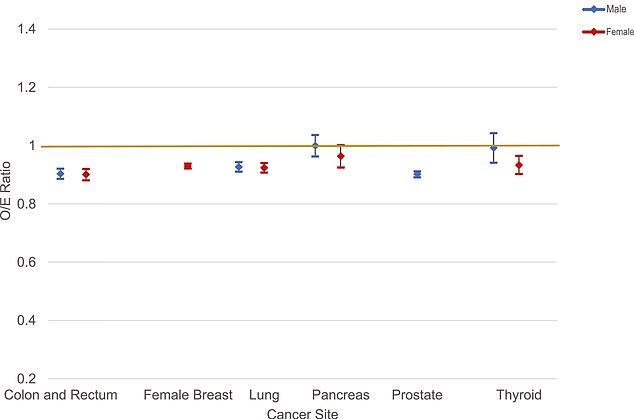Lockdowns have created a ‘ticking cancer timebomb’: Doctors warn it’ll be YEARS before death rates return to pre-pandemic levels – because hospitals focused on Covid
The US could be on the brink of a spike in cancer deaths in the coming years, after preventative screening and early diagnoses plummeted during the pandemic.
Experts are concerned that a dip in diagnostic screening in 2020 likely resulted in numerous missed opportunities to treat cancer early, which would have increased a person’s chances of survival, potentially leading to a spike in cancer deaths in the next few years.
The National Cancer Institute, a government agency, collected far fewer reports of breast, lung, colorectal, thyroid, prostate and pancreatic cancer than what would normally be expected between March and May 2020 due to healthcare disruptions.
The decline in diagnoses was greatest for breast, lung and colorectal cancers in women, types typically diagnosed through screening measures that millions of Americans missed.
Government cancer experts now fear it will take years for Americans to get back on track with their preventive health care.
In the graphs above, researchers have plotted the observed number of cancer cases in 2020 compared to their expected number of cases in 2020, or a ratio of observed to expected cases (O/E). For all cancer types included in the study, April 2020 was the month with the lowest rate

The number of cases of male thyroid and pancreatic cancer was in line with what would be expected. In women with thyroid cancer, there were significantly fewer cases than expected
When the first Covid outbreak gripped the country in early 2020, the vast majority of Americans were encouraged to quarantine at home in an effort to protect themselves from infection.
At the same time, healthcare systems have curtailed many of their elective care services to free up resources to accommodate the influx of new Covid patients.
Nearly 10 million cancer screening appointments were missed from January to July 2020 alone. The mountain of missed screenings translated into an 11 percent increase in the number of patients diagnosed with cancer that had already spread to other parts of the body that year.
Dr. Monica Bertagnolli, director of the National Cancer Institute, said: “These missed opportunities for early cancer detection are alarming, especially for those vulnerable populations who continue to face significant barriers to accessing cancer care.
“This report highlights the urgency to help all Americans get back on track with their cancer care so we can prevent unnecessary deaths and complications from cancer.”
The NCI led the largest study to date, using data from central government cancer registers to measure the impact of Covid.
Researchers from the NCI joined those from the Centers for Disease Control and Prevention, the National Institutes of Health, the American Cancer Society and the North American Association of Central Cancer Registries to analyze data on cancer cases between 2015 and 2020.
They also estimate the expected number of new cancer diagnoses in 2020 based on data from recent years. But the actual figures in 2020 showed that there were fewer newly diagnosed cases of breast, lung, colorectal, thyroid, prostate and pancreatic cancer than expected.
The researchers predicted that 7,147 cases of localized cases of colorectal cancer would have been diagnosed in 2020. Only 5,983 actually were.
There were also 4,000 fewer diagnoses of localized cases of breast cancer, as well as 1,267 fewer localized cases of lung cancer and 3,447 fewer localized diagnoses of prostate cancer.
There were also 470 fewer than expected cases of thyroid cancer and 115 fewer cases of pancreatic cancer.
The study authors said: ‘Therefore, the survival benefits of early detection may be limited for a large proportion of patients with cancer.’
Their findings, published in the American Cancer Society’s journal Cancer, are consistent with previous studies on Covid’s impact on disease screening and prevention.
A study published last month in the journal Lancet Oncology found that the number of new cancer patients fell by about 15 percent in 2020 compared to 2019, the equivalent of about 125,000 fewer diagnoses.
The biggest drop in diagnoses occurred in stage 1 cancers, or the earliest stage of the disease. Missing these risks the cancer spreading by the time it is caught, making it much harder to treat.
Dr. Karen E. Knudsen, CEO of the American Cancer Society said, “We are deeply concerned about the consequences of delayed diagnosis, which is typically associated with more aggressive disease and poorer outcomes.
‘It is imperative to ensure that we make up for lost ground in early detection of cancers, thereby maximizing the chances of effective treatment and survival.’
